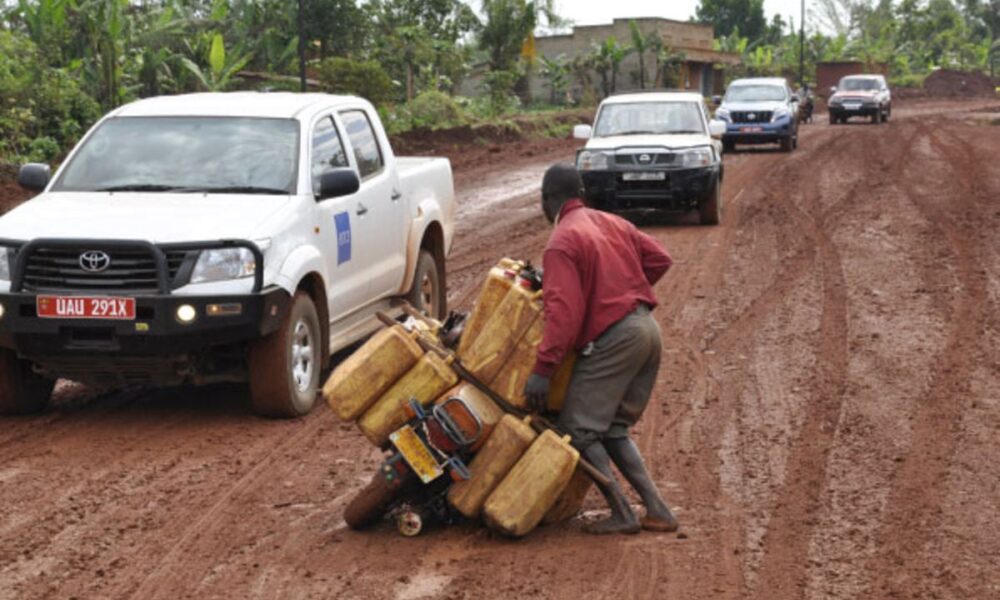
The Hidden Crisis in Uganda’s Ride-Hailing Industry: When Convenience Becomes a Risk.
By Amiri Wabusimba. As app-based transport services revolutionize urban mobility across Uganda and globally, the promise of convenience, affordability, and transparency has become their cornerstone. In Uganda, platforms like Uber, Safe Boda, and Faras have offered a lifeline for millions, enabling swift, transport in Kampala with growing urbanization and limited public transit options. Yet, behind this technological progress lies a concerning trend that threatens to undermine passenger trust, company integrity, and global standards of safety and accountability.
A recent personal experience in Kampala highlights the depth of this issue as I booked a ride with on one of the apps with confidence, relying on the app’s system to ensure fair pricing and a secure journey. During the trip, however, the driver asked about the fare quoted by the app. Expressing dissatisfaction with the amount, he continued driving but ended the trip prematurely on the app. Upon arrival, the driver demanded additional payment, citing distance as justification. Caught off guard, I paid the extra amount but left the encounter questioning the broader implications of this practice.
Across Uganda and other parts of Africa, reports are mounting of ride-hailing drivers engaging in similar manipulations. Drivers prematurely end trips on the app, leaving passengers untracked and exposed to potential risks, while demanding payments that bypass the platforms’ official fare systems. This behavior not only cheats the hosting companies but also erodes the trust that forms the backbone of their service models. Globally, ride-hailing companies face the challenge of balancing rapid expansion with ensuring operational integrity. While the African market presents enormous opportunities for these companies to grow, weak regulatory frameworks and limited oversight allow exploitative practices to flourish.
In many cases, when a trip is ended prematurely on the app, passengers are left unprotected. The app no longer tracks their journey, leaving no official record of their location or progress. In situations of dispute or emergency, this lapse in monitoring creates a dangerous vulnerability. Beyond individual safety, the broader implications of unchecked practices include financial losses for hosting companies, reputational damage, and diminished consumer confidence in the service.This issue resonates beyond Uganda, reflecting a global challenge for ride-hailing platforms. In cities like New York, London, or Mumbai, passengers occasionally report similar experiences of fare manipulation or disputes over charges. The difference, however, often lies in the robustness of consumer protection mechanisms and the ability of governments to hold companies and drivers accountable.
To maintain their Uganda reputation and foster sustainable growth, ride-hailing companies must prioritize passenger protection and operational transparency. First, these platforms should implement real-time monitoring systems to detect anomalies such as prematurely ended trips. Automated alerts should notify both the passenger and the company in such cases, ensuring immediate action can be taken. Secondly, companies must enforce stricter penalties for drivers who exploit loopholes, including suspensions or permanent bans for repeated offenders. Such measures should be accompanied by improved grievance mechanisms, allowing passengers to report irregularities and receive swift resolutions. Transparency is key to rebuilding trust and ensuring that passengers feel secure when using these services.
Governments has a crucial role in Regulatory frameworks that must be updated to address the unique challenges posed by app-based transport systems. Licensing bodies should collaborate with tech companies to establish standards for driver conduct, fare transparency, and passenger security. Globally, regulators and ride-hailing platforms must work together to ensure that technological innovation does not outpace consumer protection.
The rise of ride-hailing apps represents a technological milestone in Uganda urban mobility. However, as these platforms grow, they must address the systemic vulnerabilities that threaten their credibility. The integrity crisis affecting Uganda and other parts of Africa serves as a microcosm of a broader issue that demands urgent attention. To achieve the Uganda vision of safe, efficient, and equitable transport for all, ride-hailing companies, governments, and consumers must unite in demanding higher standards of accountability and transparency. Only then can the promise of this transformative technology be fully realized, offering not just convenience but also the trust and security that every passenger deserves.
Amiri Wabusimba is a diplomatic Scholar, Journalist, political analyst and Human Right activist. Tel: +56775103895 email: [email protected].
The Hidden Crisis in Uganda’s Ride-Hailing Industry: When Convenience Becomes a Risk.
News
A Over Shs 24 billion Highway to Fraud » The Hoima Post –

ROMISE: A modern, tarmacked road linking Mukono to Katosi in central Uganda, improving access and accelerating development.
REALITY: A maze of fake companies, forged documents, and missing billions.
AMOUNT LOST: Over Shs 24 billion
IMPLICATED: Abubaker Technical Services (a ghost contractor), Dan Alinange (then UNRA spokesperson), senior officials in the Ministry of Works and Transport
The Dream: Infrastructure That Connects, Develops, and Delivers
The Katosi-Mukono-Nyenga Road was touted as one of Uganda’s critical infrastructure projects—a 74-kilometre lifeline that would link rural communities along Lake Victoria to urban centers and markets. Once constructed, it would ease transport bottlenecks, improve agricultural trade, and shorten travel time between Mukono and Buikwe districts.
In 2013, the government of Uganda—through the Uganda National Roads Authority (UNRA)—announced a Shs 165 billion contract for the road’s construction. The contractor? A little-known firm named Eutaw Construction Company, allegedly from the United States, working in partnership with Abubaker Technical Services and General Supplies, a local firm.
But from the outset, red flags waved in broad daylight.
The Reality: A Highway to Nowhere
The first sign of trouble came when Eutaw Construction Company, the “lead contractor,” was discovered to not exist in any official registry of the United States. UNRA had claimed that Eutaw was selected after a competitive procurement process, beating out several established firms. But investigations later revealed that Eutaw was a phantom company, used as a front by Ugandan operatives to siphon off public funds.
Even more baffling was that Abubaker Technical Services, the local subcontractor, had no previous road construction credentials of the magnitude needed for a project of this scale—and was, in fact, not officially registered at the time of contract award.
Despite these glaring anomalies, Shs 24 billion was immediately advanced to the so-called contractors—ostensibly as mobilization fees. Within weeks, the money was gone, and the road remained untouched.
The Role of UNRA: Complicity or Incompetence?
The scandal implicates several senior figures at UNRA. At the center was Dan Alinange, the UNRA spokesperson at the time, who consistently defended the integrity of the project in public briefings. Alinange and other officials maintained that due diligence had been done and that Eutaw was “fully verified.”
But a 2015 probe by the Inspectorate of Government (IGG) found otherwise. The report revealed that UNRA deliberately ignored multiple warnings from internal auditors and whistleblowers who questioned the legitimacy of Eutaw and Abubaker Technical Services.
The report also showed that certain individuals within UNRA approved advance payments in record time—without verifying the contractor’s physical address, financial records, or previous work experience.
A Timeline of Fraud
-
2013: Eutaw Construction Company awarded contract to build the 74km Mukono-Katosi-Nyenga Road.
-
Early 2014: Shs 24 billion paid upfront to Eutaw (later traced to Abubaker accounts).
-
Mid 2014: Site inspection reveals slow progress and lack of heavy machinery.
-
Late 2014: IGG launches investigation after whistleblower tips off Parliament.
-
2015: Government admits Eutaw does not exist and cancels the contract.
-
2016–2017: Project re-awarded to China Railway Group Limited; works begin afresh.
The Fallout: Who Paid the Price?
Despite the scandal’s magnitude, accountability was selective and minimal. A few low-level officials were suspended, and the contract was terminated—but no high-ranking official, including Dan Alinange, faced prosecution.
Instead, the government quietly re-awarded the project to China Railway Group Limited, which eventually completed the road in 2019. The loss of Shs 24 billion was absorbed by taxpayers. No funds were recovered from Eutaw or Abubaker.
The scandal revealed deep institutional weaknesses in procurement, internal audit bypasses, and executive protection of those involved. While the road was eventually completed, it came at double the original cost and after significant delays.
Public Outrage and Institutional Shame
The Anti-Corruption Coalition Uganda (ACCU) and other civil society organizations labeled the Katosi scandal as “a monument to impunity.” The matter was also discussed in Parliament, with MPs demanding a full audit of UNRA’s operations. However, the debate fizzled out without tangible results.
The Katosi project also triggered a broader investigation into UNRA’s procurement record, revealing over 20 ghost contractors, inflated contracts, and billions of shillings lost between 2009 and 2015.
A Pattern of Plunder
The Katosi Road scandal is not just an isolated case—it is part of a broader, systemic pattern where infrastructure projects in Uganda become vehicles for corruption. Whether it’s ghost schools, fake health centers, or vanished road contractors, public investment often ends up in private bank accounts.
In a nation where roads are lifelines, the theft of road funds is not just financial corruption—it is a theft of opportunity, a theft of development, and in many cases, a theft of life as citizens die from lack of access to emergency services due to poor road networks.
The People’s Verdict
Today, commuters drive along the completed Mukono-Katosi road unaware that it sits atop a scandal that robbed Ugandans of more than money. It robbed them of trust. It sent a clear message: in Uganda, promises are made for plunder, not progress.
Quote of the Scandal:
“We thought we were building a highway to prosperity. Instead, we built a tunnel for thieves.” — Local council leader in Mukono District
Editor’s Note:
This exposé is part of our “Roads to Ruin” series, tracking Uganda’s most scandalous infrastructure failures. If you have tips or evidence related to this story, contact our investigative desk
https://hoimapost.co.ug/ugandas-stolen-billions-the-katosi-road-project-scandal-a-over-shs-24-billion-highway-to-fraud/
https://hoimapost.co.ug/ugandas-stolen-billions-the-katosi-road-project-scandal-a-over-shs-24-billion-highway-to-fraud/ , hoimapost.co.ug
https://hoimapost.co.ug/ugandas-stolen-billions-the-katosi-road-project-scandal-a-over-shs-24-billion-highway-to-fraud/ , https://hoimapost.co.ug/ugandas-stolen-billions-the-katosi-road-project-scandal-a-over-shs-24-billion-highway-to-fraud/ ,
hoimapost.co.ug , https%3A%2F%2Fhoimapost.co.ug%2Fugandas-stolen-billions-the-katosi-road-project-scandal-a-over-shs-24-billion-highway-to-fraud%2F
News
🔴 MANCHESTER UNITED – LYON LIVE / 🚨LYON REVE D’EXPLOIT A OLD TRAFFORD / EUROPA LEAGUE / LIGUE EUROPA

Thanks for tuning in Introduce yourself to the Omusawo Tintah community in the comments and let us know where in the world you’re listening from. Enjoy! Love, Deo
#relaxingmusic
#meditationmusic
#yogamusic
#studymusic
#spamusic
source
News
Ja Rule Leads Moving Irv Gotti Tribute Weeks After His Passing

Join this channel to get access to perks:
https://www.youtube.com/channel/UCE08U2ONFMOjV8TX2o3RQbA/join
Give thurmbs Up if you like this Video.
SUBSCRIBE. SHARE. LIKE. COMMENT
► Subscribe To
https://www.youtube.com/channel/UCE08U2ONFMOjV8TX2o3RQbA
DISCLAIMER: Content might be gossip, rumors, or exaggerated – based on trending news on social media, Twitter and otherwise. Viewers are advised to do their own research before forming their opinion.
ENTERTAINMENT I LIFESTYLE I POLITICS I SPORTS I POLITICS I PROMOTION
**************** *************. **********. *********. ********* **************
………………………………………………………………….
source






